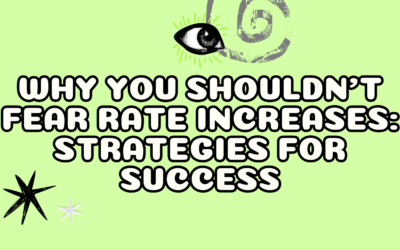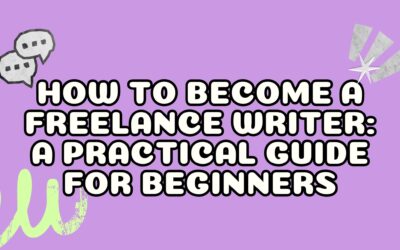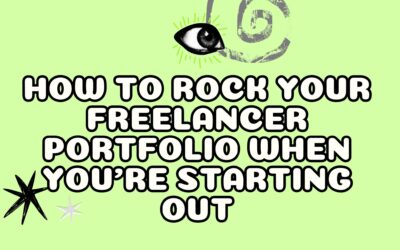The internet is a beautiful thing, right? We can find everything we want with the swish of a finger and the click of a button. Just type “advice for freelancers” into Google and you’ll have ALL the secrets you need to make it big.
Well, actually, no.
I mean, there is TONNES of advice out there for freelancers (and the irony of me writing advice about advice for freelancers is not lost on me) – so much so, that it’s difficult to even know where to start.
Every day I get between five and ten emails from readers who are asking about their careers. Most of them would like to know how to get started, while others have seen articles saying they need to have a professional website or they need to charge higher rates.
In fact, one such email dropped in my inbox the other day. The sender, a student of mine, had seen a post from a popular freelancer saying that they needed a professional, paid-for website (i.e. with their own domain) if they wanted to be taken seriously.
For the first year of my career, I used a free Weebly site for my services and portfolio.
Guess what? At no point did a potential client not hire me because I didn’t splash out money on a fancy website.
This is just one of many pieces of advice that’s circulating the interwebs that’s hailed as a “must-do”, but really, really isn’t a necessity. At all.
So, in light of this rant, here are 3 reasons you shouldn’t listen to ALL the advice for freelancers (me included!).
Why You Shouldn’t Listen to ALL the Advice for Freelancers
1. What worked for one might not work for many
This is a key problem circulating the ENTIRE web these days – not just the freelancing world.
Entrepreneurs, blog owners, and “experts” tout that you “must do X” if you want to succeed, or without X you’ll have no chance.
There’s been a lot of talk about email lists in the past year, and so many bloggers and writers shout from the rooftops that it’s the MOST important thing in your business.
I had an email just yesterday from a reader who wanted to know if they really needed an email list for their services website if they were just using it for showing clients what they were capable of and sharing their contact details.
In this situation, the answer is: absolutely not.
If the thought of creating an email list fills you with overwhelm and it’s just one more thing you need to get your head around, don’t do it!
Just because an email list worked ridiculously well for one freelancer, doesn’t mean it’ll be the same for you – especially if you hate the thought of having an email list.
Which brings me to my next point…

2. Your business should make YOU happy
There seems to be this trend in the freelancing world where people are quick to judge others on what they charge and what services they’re offering (just head over to the freelance writers subreddit on Reddit and you’ll see EXACTLY what I’m talking about!).
The thing is, we all go into freelancing for different reasons.
When someone joins my email list, I ask them what their “why” is – why they want to go freelance – and the answers are incredibly inspiring but, more than that, they’re incredibly different.
We don’t all go freelance for the same reasons, even if it seems like it.
It’s easy to think that we’re doing things oh-so-wrong when we’re starting out because someone has said we’re doing it wrong, even if we’re happy with our success so far.
I remember in the early stages of my career, I was chuffed when I landed a recurring writing gig for $50 per piece. I never thought I’d be able to get paid that much.
But then I started digging into advice for freelancers on other sites and was told over and over again that I was charging too little.
It’s safe to say that thoroughly burst my bubble.
In the brief moment before I’d listened to anyone else, I was happy. We all have to start somewhere, and I was more than happy to start there.
3. Only YOU know your goals
This is the thing that gets me the most. A lot of the advice for freelancers out there assumes that all freelancers (every single one of them) want to earn six figures and be the best in their niche.
In reality? Well, like I said before, I’ve heard so many different “whys”, from spending more time with family and friends, to being able to look after ourselves better if we’re suffering with a mental or physical illness.
If I went round the metaphorical room, I bet we’d ALL have different goals; we’d ALL see ourselves in different places in the ten years’ time.
Some faceless person on the interwebs spouting that you need to be charging AT LEAST $250 per piece or else you’re ruining the world? They don’t know what you want to achieve. They don’t know your goals.
In fact, people who TELL you what to charge are most likely bitter with the industry. They think that because there are people out there charging lower than them, the industry is ruined and they can’t get enough money.
The truth is there will ALWAYS be people out there charging less that you, maybe even freelancers with more experience. But if you’re good enough at what you do, there will ALWAYS be clients willing to pay your prices.
There’s no limit to the amount of freelance jobs out there. It’s not a lake that’s going to run dry anytime soon.
Now, as you know, I like to make my posts actionable so you can take something away with you at the end of it. So today, I’d like you to write down the following:
- What are YOUR specific goals for freelancing? What’s YOUR ‘why’?
Now post it in the comments below (writing it out makes it real, right?!).
Remember, you don’t have to listen to all the advice for freelancers out there.
I know it’s difficult to turn it all off and shut it all out, and I’m not saying you should stop reading altogether. Just take it with a pinch of salt and really think about whether it’s something you want to apply to your business.






I fell into some freelance work with my previous company after my husband and I moved so the transition from office to freelance was a little bit easier, but still stressful figuring out the little details. This is a great resource!
It’s the little details that are always the most stressful, right?! Glad you liked the post, Ashley!
Thanks for the reminder. As a fiction writer, I needed to be reminded of this and had to keep telling myself “You are not like every other writer. What works for them won’t work for you.” As a newbie, I’m reading about needing a website, needing to start a blog, and being active on social media. As a copywriter who plans to focus on client success stories, I don’t feel the need to start a blog. Because I’ve noticed that other strictly case writers don’t keep up with their OWN blogs. The only thing I’m worried about is being on social media. I have a personal FB page that I post on occasionally. And I scroll through it. Occasionally. I also have a personal Twitter account that I don’t post on whatsoever. Or scroll through. For me, it all comes down to one question: what the hell is a newbie case writer going to say that a case writer expert hasn’t already said? I mean, am I shooting myself in the foot if I don’t have an active presence on social media? I came across a case writer’s website where the only place he said to connect with him is on LinkedIn. To me, THAT made more sense than FB, Twitter or even G+
You’re definitely not shooting yourself in the foot, Celise! That other case writer had it right – focus on what works for YOU and what you can keep up with. If it’s just LinkedIn, that’s totally fine. It’s much better to master one social channel than try and spread yourself too thin across all of them.
I just want to offer peace of mind to my clients by creating clarity-driven content that communicates their mission and attracts their ideal clientele. That’s it – *tears*
Such a great goal, Raquel! Your clients are going to absolutely love you for that.
This is a great post, and I totally agree with your opinions.
I think most freelancer advice is given from a top-level perspective, with a focus on the “finished goods”. In addition to this, most advice is actually a generalization, and in 9 out of 10 cases, wont work at all in real life.
Moreover, “real life” varies from one to the next.
The problem is that we all want to be successful. Freelancers want to be successful. So what do we do? We look up to our champions, to our heroes, to our experts, and we model ourselves in their likeness. The end result is usually less successful than we expect, because we don’t have the exact same circumstances or situations as they did.
Success is not a formula.
I think it is a good idea to have mentors. It is also a good idea to have peers, as well as a good idea to have students. At the same time. Meaning that we learn, we share, and we teach. Some people refer to this as the Plus, Equals, Minus effect.
That approach will usually lead to a rounded understanding of our own unique situation, and will help us determine the direction to take for eventual success, and how to recognize and measure that success when it arrives.
So, yes, a lot of online advice for freelancers don’t hold up in real-life. Some of it is plain wrong, and the rest don’t apply.
This is why I agree that we should *not* listen to *all* the advice for freelancers.
Instead, we should select mentors from among people that we truly know and trust, not just from anonymous websites, or unproven experts. We should also select peers carefully from among people we interact and network with. Then we should select a few people who we can see as being a step behind us, so we can help them succeed where we struggled.
My feeling is that if freelancers are able to do the above, we won’t pay any attention to advice from sources that we don’t know and trust.
Freelancing is hard enough without us getting misdirected by ambiguous advice.
Hey CJ – thanks so much for taking the time to write a lengthy, well thought-out response. I really enjoyed reading it, and completely agree with everything you say!
It’s true that we should be selective about who we listen to and what advice we choose to take on for ourselves. Not every business is the same, which means blanket advice from freelancers can be detrimental to some newbies.